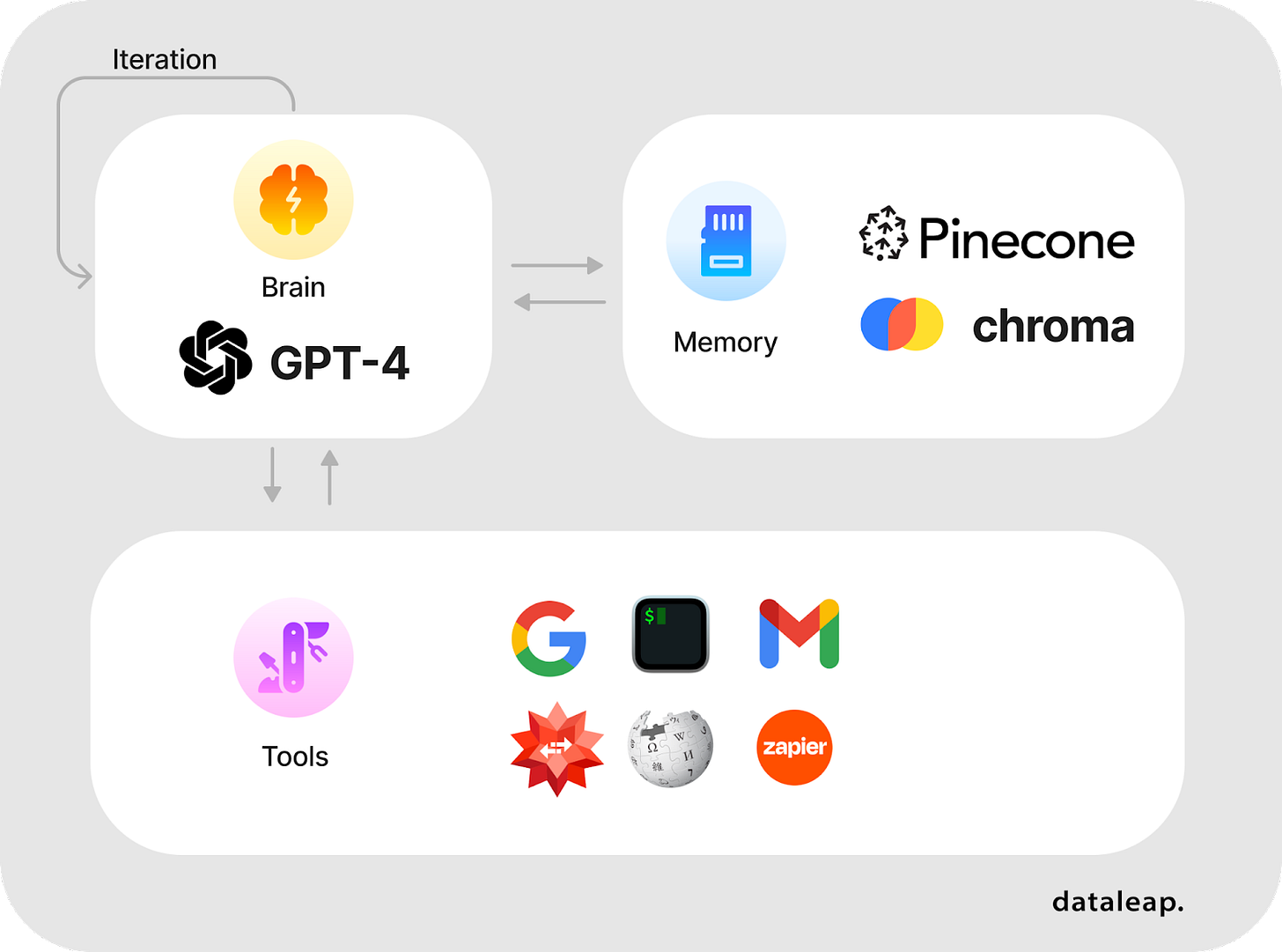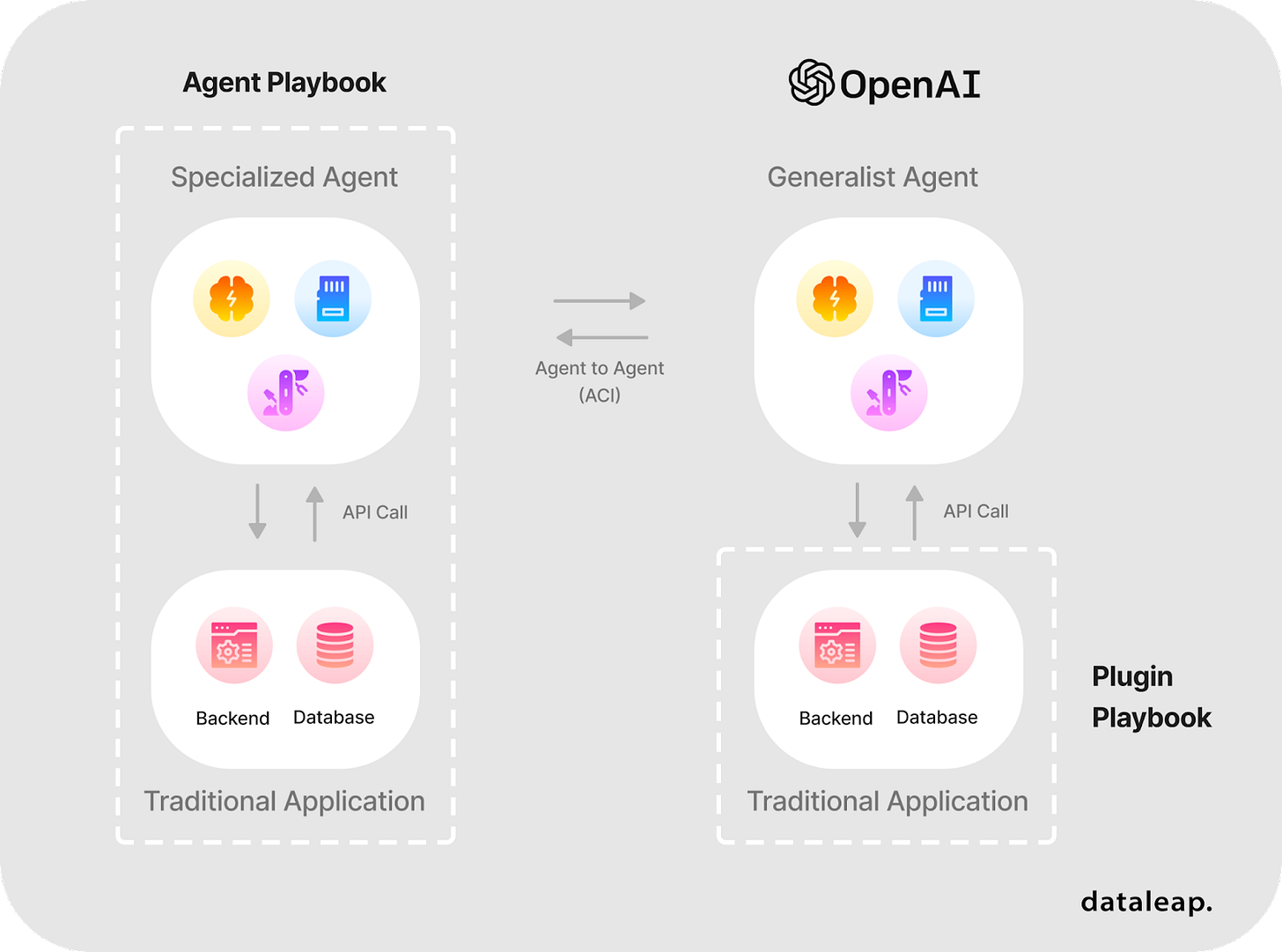The AI Crossroads: Picking Between Classic Plugins and Specialized Agents
Uncovering the 6 critical factors to consider for your AI strategy
As artificial intelligence continues to revolutionize the digital realm, existing businesses like Klarna or Zillow are grappling to find the best strategy to adopt their products to the new AI agent paradigm. Should they develop a plugin for the OpenAI marketplace or invest in their own specialized agents?
Before we dive in headfirst, let's take a moment to step back and break down what an agent truly is. In my ever-adapting understanding, there are four core components that make up an agent:
Brain: Agents harness the might of GPT-4 and GPT-3.5 language models, which serve as their intellectual powerhouse, enabling them to think, reason, and engage in complex problem-solving.
Iteration: Much like diligent students, agents can learn from their mistakes, iterating on their past work and leveraging their history to generate increasingly accurate results.
Memory: By integrating with vector databases or other storage solutions, agents develop long-term memory, allowing them to preserve context, recall past experiences, and ultimately, make well-informed decisions.
Tools: Armed with an array of tools, such as browsers, data loaders, APIs, other ML models, or even fellow agents, these AI mavens can tackle a vast array of tasks, setting them apart from their predecessors. It's like equipping our digital friend with a Swiss Army knife of skills to conquer the challenges ahead.
With that definition established let’s look at the two playbooks companies can choose.
Plugin Playbook: Businesses build traditional applications and generalist agents like GPT-X call their REST APIs and process the responses in their super-powered reasoning engine
Agent Playbook: Businesses embrace a new standard of agent-to-agent communication. Specialized agents communicate back end forth with generalist GPT-X-like models via an agent communication interface (ACI).
In a previous article, I already delved into the Super AI Thesis versus the Specialized Agents Thesis. This time, however, I want to approach the same question from a slightly different perspective.
In this piece, we'll examine six major factors that can help determine whether a specialized agent is the right choice for a given task, or if the classical API pattern might suffice:
Data Sensitivity: When minimal information disclosure is the goal, specialized agents excel at selectively sharing pertinent data, keeping sensitive details under wraps.
Data Value: If raw data is highly valuable and leakage is a concern, specialized agents operating on aggregated data become vital, disclosing only the bare minimum needed.
Flexibility: Data APIs can efficiently deliver specific data points for simple, predictable use cases. But when it comes to more intricate, long-tail requests, specialized agents offer a level of flexibility and adaptability that's tough to match.
Domain Expertise: Specialized agents can be crafted to embody domain-specific knowledge and expertise, empowering them to provide accurate and meaningful insights.
Real-time Negotiation: In situations where dynamic negotiation between agents is a must—think data access pricing or meeting schedule wrangling—specialized agents can effectively interact and strike mutually beneficial deals. Static data APIs just don't have that same negotiating prowess.
Value Capture: Owning the entire stack to maintain a competitive edge and foster innovation within your control.
Join me as we unpack each of these factors, shedding light on the increasingly complex world of AI-driven data exchange and the delicate decision between "dumb" plugins and specialized AI agents.
Data Sensitivity: The Art of (Data) Sharing
In the age of AI, striking a balance between data access and protecting sensitive information is crucial. Enter specialized agents, your personal digital concierge that only shares what's needed for the task at hand—like scheduling a meeting—while keeping everyone's calendar details under wraps. This level of discretion is a game-changer in the digital world, where privacy concerns are paramount. With specialized agents, your data remains safeguarded, and the risk of unauthorized access is mitigated.
Moreover, these agents can seamlessly adapt their disclosure strategies based on the context of the request, relationships between participants, and any applicable privacy policies. This dynamic customization is a tall order for traditional data APIs, which tend to offer a more static, predefined set of data access and filtering options. As a result, specialized agents offer an unparalleled level of data protection without sacrificing efficiency.
Data Value: Keep the Keys to the Kingdom
In the world of data, less can sometimes be more. For companies that thrive on their unique data troves, there's a strong incentive to share just enough information to get the job done—without giving away the keys to the kingdom.
Take Zillow, for example. As a leading provider of real estate and rental data, they have a vested interest in ensuring their proprietary information remains under their control. Enter specialized AI agents, which offer a smart solution for maintaining that control while still providing value to users.
These specialized agents act like Zillow's personal data butlers, adept at fetching, interpreting, and transforming housing data to meet users' needs. The key is only sharing the aggregate result e.g. average real estate price in a certain neighborhood but never the atomic data with the requesting agent. Thereby, Zillow can maintain a tight grip on access and prevent any unwanted data leaks.
Flexibility: Everything everywhere all at once
Unlike traditional APIs, specialized agents shine when it comes to flexibility. They can handle diverse data requests and even dynamically negotiate the price for the data based on its value and complexity. This adaptability is essential in the fast-paced digital landscape, where businesses and users alike demand personalized, context-aware solutions.
In addition, specialized agents can access and utilize an array of tools and resources to deliver the desired information. This empowers them to cater to highly specific, long-tail requests that traditional APIs struggle to address. The result is a more comprehensive, tailored solution that meets the user's precise needs.
Domain Expertise: When Specialization Reigns Supreme
In scenarios involving intricate, unstructured data sets or advanced processing, specialized agents outperform generalized models. Think legal document analysis or healthcare diagnostics—these agents bring deep domain expertise to the table. This expertise allows them to accurately interpret and process complex information, delivering high-quality insights and recommendations.
In the legal field, specialized agents can navigate the labyrinth of contracts, court rulings, and regulations with ease. They can quickly parse and analyze the text, extract pertinent information, and highlight insights that a generalized model might overlook. Similarly, in healthcare, specialized agents can securely access and analyze sensitive medical records, patient histories, and clinical trial data, adhering to strict privacy regulations while providing tailored insights.
Real-time Negotiation: The Dance of Agents
Imagine two dancers, effortlessly adapting to each other's moves in a hypnotic routine. That's the spirit of real-time agent negotiation—something old-school APIs can't match.
Agents negotiate dynamically, adjusting to context, data requests, and privacy constraints. No more failed API calls or weird error codes. It's all about fluid, efficient communication that serves everyone's needs. This adaptability enables dynamic pricing models, helping data providers extract maximum value while keeping prices fair and transparent.
The real magic? Real-time negotiation cultivates a symbiotic relationship between agents, sparking innovation and unlocking hidden value across industries. Meanwhile, classical APIs are stuck in a rigid dance, unable to adapt or respond to the ever-changing needs of businesses and users.
Value Capture
Let's cut to the chase: building your own specialized agent means taking control of the value creation process, and that's where the magic's at. Sure, plugins have a role, but they risk leaving your product as just another "dumb" tool.
You don't want to be a commoditized player, missing out on innovation at the AI agent and user experience level. AIs are rational consumers, laser-focused on the best value for their money when deciding what service to use. To stay ahead, own the entire stack—from traditional foundations to specialized agents. That's where real innovation lies, and it's how you'll maintain a competitive edge. Embrace specialized agents and unleash your business's full potential in the AI era.
Parting thoughts
As we venture deeper into the AI-driven era, I believe that specialized agents will play an increasingly pivotal role in shaping our digital future. With this vision in mind, we've created Dataleap—the "Upwork for AI Agents"—a platform where humans can hire agents and agents can delegate tasks to their specialized counterparts. To learn more about our ambitious vision and the fascinating world of AI agents, be sure to check out the vision post linked below.
To businesses everywhere, I highly recommend seriously considering your AI agent strategy—it's always better to be ahead of the curve than lag behind. If you need assistance or simply want to brainstorm ideas, don't hesitate to contact me at jan.damm[at]dataleap.xyz.
There are definitely also a lot of downsides when comparing agent-to-agent communication with classical API as they are less deterministic and reliable for now but that’s a topic for another blog post.





